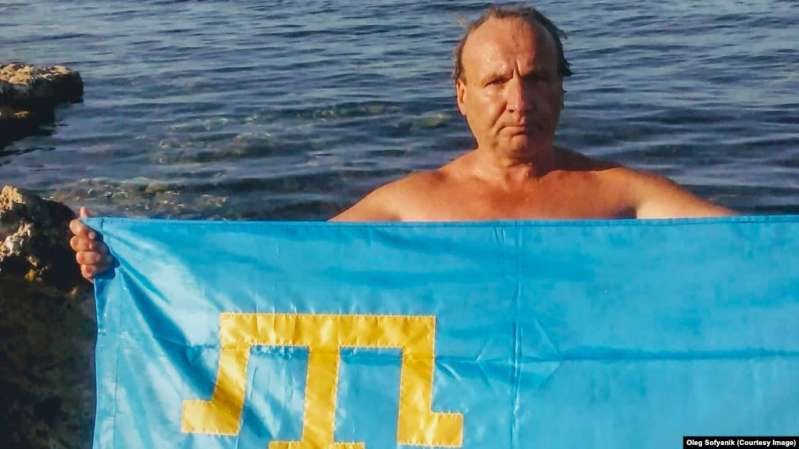Back in the USSR: Russia stops ex-dissident from leaving occupied Crimea after threatening punitive psychiatry

Oleh Sofianyk, a marathon swimmer and former dissident, has been prevented from leaving occupied Crimea, in Russia’s latest eery rerun of the repressive measures that the Soviet regime used against the 56-year-old thirty years ago.
Sofianyk tried to cross the administrative border from Crimea into mainland Ukraine on 17 April, but was stopped on the pretext that Sofianyk is a Russian citizen. On 21 April, Sofianyk explained to Krym.Realii that the citizenship had been foisted on him and that he considers it an illegitimate document. He said that he has therefore contacted the Russian Interior Ministry, demanding that the citizenship be revoked. Russia has effectively forced Ukrainians to receive Russian passports, making it impossible to get work, received medical care, register children in schools, etc. without it. In a further criminal move, Russian President Vladimir Putin recently issued a decree allowing Ukrainian citizens, who do not hold Russian citizenship, to have their land taken from them. Sofiyanyk says he fears that he will be imprisoned or placed in a psychiatric hospital if forced to remain in Crimea and expressed the hope that Ukrainian President Volodymyr Zelensky and the Human Rights Ombudsperson, Ludmila Denisov can help him leave the occupied peninsula.
On 14 November, 2019, Sofianyk was detained by the FSB on the administrative border between the Kherson oblast and occupied Crimea. He told Krym.Realii then that he had first been made to wait about an hour when leaving Crimea, then an hour and a half when returning. When he asked what was going on, the FSB border guards said “We don’t know, Moscow decides, the border guard department decides what to do with you”. As Sofianyk himself noted, this was clearly a threat of what he could face if he did not leave occupied Crimea.
Sofianyk never made any secret of his opposition to Russia’s annexation of Crimea. In July 2015, after being summoned for FSB interrogation while in mainland Ukraine over the arrest of Ukrainian blogger Yuri Ilchenko, Sofiyanyk announced that the situation was worse than in Soviet times, and that he could not return to Crimea. It is not quite clear when he later decided to return to his native Sevastopol, but it seems likely that he was then forced to take on Russian citizenship.
The 56-year-old marathon swimmer has taken part in many swimming events and is known beyond Ukraine. That renown may have initially made the FSB cautious of engaging in open harassment, although that clearly changed from November 2019. It is possible that the reason lies in two marathon swims. On 20 April 2019, Sofianyk swam his first marathon in memory of the victims of the 1944 Deportation of the entire Crimean Tatar people (recognized by Ukraine as an act of genocide). In October 2019, he swam 30 kilometres in 10 hours from Lukull Cape in the west of Crimea to Omega Bay in Sevastopol also to mark the 75th anniversary of the Deportation and to remind the world of the tragedy of the Crimean Tatar people. He had initially planned to swim a huge marathon from Crimea to Turkey in August 2019, but decided against this as he did not wish to violate Ukraine’s territorial borders. According to Ukrainian law, Crimea must be entered or left via a Ukrainian port.
On 11 February 2020, Sofianyk reported that he had been summoned to a psychiatric hospital in Sevastopol, and told that if he didn’t go voluntarily, he could be taken by force and held there permanently. He noted then that the hospital had known a telephone number that was not widely available and said that he believed the FSB to be behind the move, due to his pro-Ukrainian stand. When he told the woman on the telephone that he would not come, she said that she had warned him and that they would “take measures”. Sofianyk then also reported being followed and having his phone tapped.
He said that he had decided to leave Crimea, as he risked having drugs or weapons planted on him, as they had done with pro-Ukrainian activist Oleh Prykhodko.
“It’s effectively [like] 1937 [the worst year of Stalin’s Terror] in Russia now, with a pensioner [Prykhodko] arrested on insane charges of trying to blow up the Saki City Council. I’m sorry but even in Soviet times there wasn’t something like this. People were arrested for leaflets, for specific actions. Nobody had terrorism pinned on them. In my case anything could happen, because they need to imprison somebody, get people for new exchanges.”
Sofianyk was not around in 1937 but he does know at first hand about Soviet repression. In 1977, while still at school, he was detained by the KGB for letters to Deutsche Welle and leaflets calling on people to fight the regime. Due to his age, the KGB confined itself to ‘a prophylactic chat’.
In 1979, he and friends formed a Committee of Freedom Fighters which circulated leaflets. He and his friend Ihor Sharts were both arrested in March 1979, but he was eventually released since he was still under 18.
He was later twice subjected to punitive psychiatry for his refusal to serve in the Soviet Army and his attempt to renounce Soviet citizenship.





